
Basecamp has long been a staple in project management, offering teams a centralized platform for collaboration and task tracking. However, as project demands evolve, many organizations seek alternatives that provide enhanced features, flexibility, and customization to better align with their unique workflows. Below, we’ll explore some of the top alternatives to Basecamp, highlighting their key features, advantages, and considerations to help you make an informed decision.
Quick Overview – Best Basecamp Alternatives in 2025
- FuseBase – AI-powered project management and client collaboration with customizable portals
- Trello – Simple, Kanban-based task boards for easy visual organization
- ClickUp – All-in-one platform with tasks, docs, goals, and time tracking
- Asana – Structured workflows with timelines, dependencies, and automation
- Monday.com – Highly customizable boards with strong automation and reporting
- Teamwork – Client-focused management with time tracking, invoicing, and resource planning
What is Basecamp?
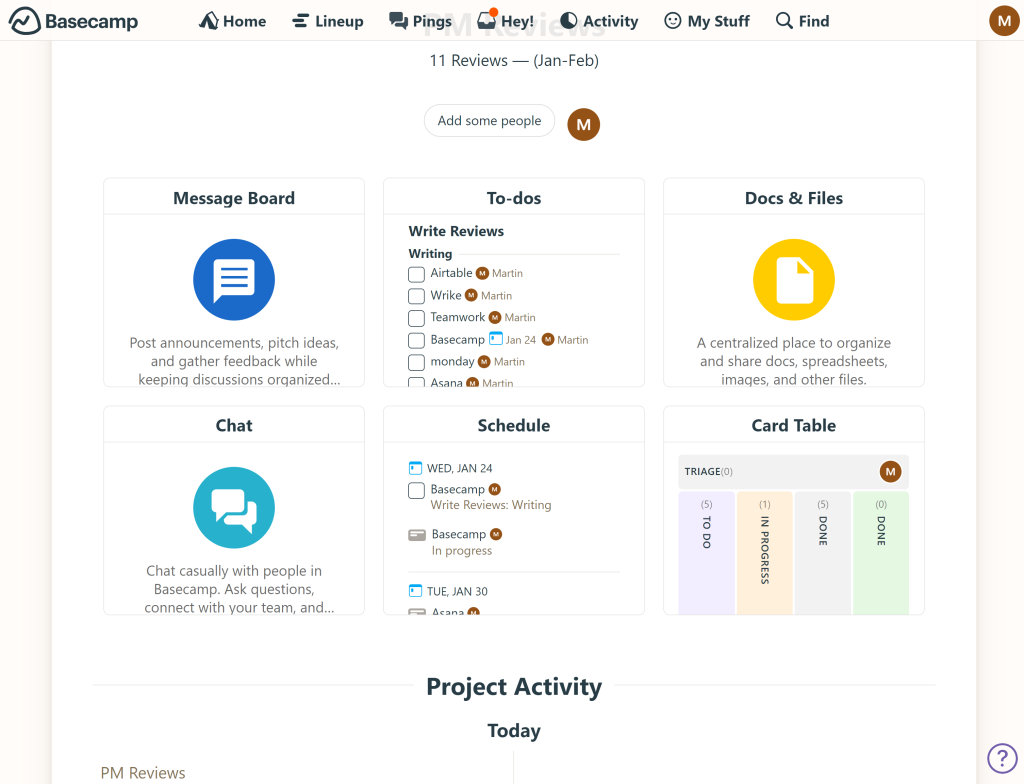
Basecamp is a project management software and team collaboration tool that helps businesses and teams organize their work in a centralized space. It simplifies communication, task management, and document sharing to improve productivity.
Basecamp is widely used by startups, remote teams, and businesses of all sizes to streamline their workflows and improve team collaboration. However, depending on your specific needs, you may find that some Basecamp alternatives offer better features for your projects.
Key Features of Basecamp
- Task Management and To-do Lists: Assign tasks, set deadlines, and track progress to ensure accountability.
- Shared Calendars and Scheduling: Plan project timelines, manage deadlines, and keep everyone aligned.
- Automated Check-ins: Reduce unnecessary meetings by allowing team members to share progress asynchronously.
- Document and File Storage: Organize and share files securely within your team.
- Real-time Messaging (Campfire Chat): Enable instant communication between team members for quick discussions.
Limitations of Basecamp
- Limited Customization: Basecamp lacks the ability to create highly customized workflows, making it less adaptable for businesses with unique project structures.
- No Time Tracking: Basecamp does not offer built-in time tracking, requiring third-party tools to monitor work hours and productivity.
- Limited Integrations & Automation: Basecamp supports fewer third-party integrations and lacks advanced automation features, which can be a drawback for teams using multiple tools.
- Basic Task Management: Complex project planning can be difficult due to a lack of advanced task dependencies and subtasks.
Basecamp Pricing
Basecamp offers a free plan and two pricing plans:
- Free Plan: Available for one project at a time.
- Plus: $15 billed monthly per user per month.
- Pro Unlimited: $299 per month (billed annually) or $349 per month (billed monthly) for the whole organization.
6 Best Alternatives to Basecamp
If you’re looking for Basecamp competitors that provide more flexibility, advanced collaboration tools, or enhanced customization, here are six powerful alternatives to upgrade your project management:
1. FuseBase
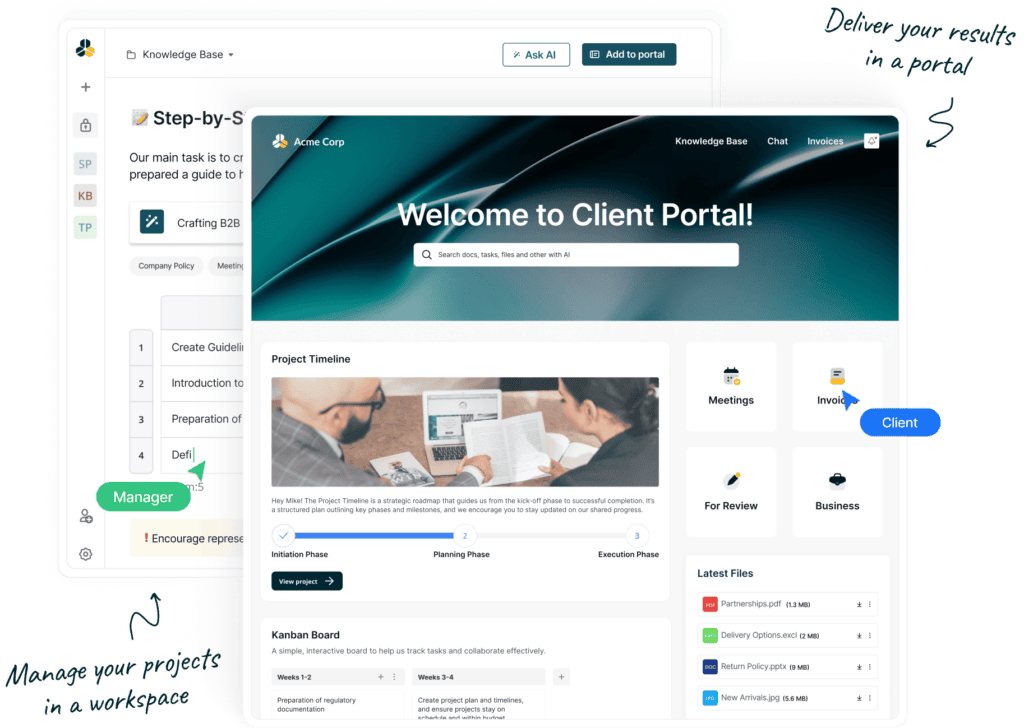
FuseBase is a versatile project management and collaboration platform that combines document creation, task management, and AI-powered tools. Designed for businesses that require flexibility, FuseBase allows teams to create structured workflows, manage content efficiently, and collaborate seamlessly. In addition, it offers customizable portals for working with your clients.
Best for: Teams that need AI-powered tools, client collaboration, and customizable workspaces for efficient project management.
Pros:
- White-label customization for branded workspaces and portals
- AI-powered automation to streamline workflows and reduce manual tasks
- Comprehensive task management with Kanban boards, time tracking, and deadlines
- Powerful document creation with interactive, multi-format super documents
- A scalable solution that scales as your business does
Cons:
- Advanced features may need training for new users
Pricing (billed annually):
- Free Plan: available for 1 workspace and 1 client portal.
- Solo: $32 per month for personal use.
- Essentials: $82 per month for small teams.
- Advanced: $332 per month for larger teams.
- Unlimited: custom pricing.
2. Trello
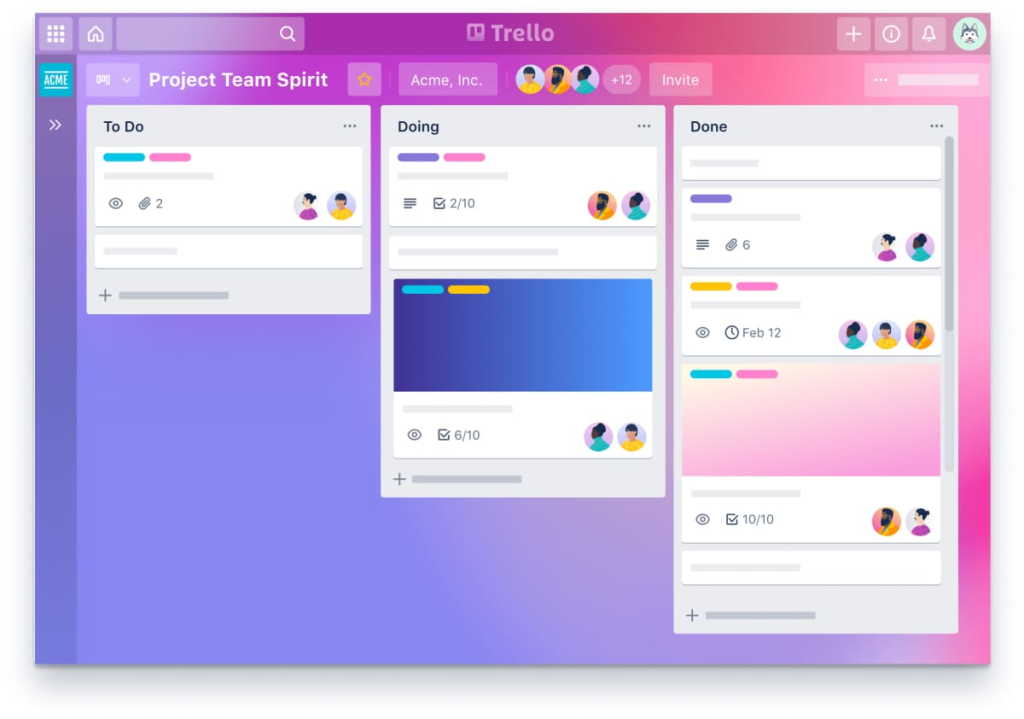
Trello is a Kanban-based project management tool that simplifies task organization with visual boards, lists, and cards. Its simplicity and ease of use have made it a favorite among teams seeking straightforward task management solutions
Best for: Teams that prefer visual Kanban-style project management.
Pros:
- Simple drag-and-drop interface for task management
- Highly visual and customizable boards, lists, and cards
- Likely meets your project needs for simpler cases
- Has custom fields and various data formats for task cards
Cons:
- Limited reporting and analytics compared to other tools
Pricing (billed annually):
- Free Plan: available with a limited number of boards.
- Standard plan: $5 per user per month.
- Premium Plan: $10 per user per month.
- Enterprise plan: from $17.50 per user per month.
3. ClickUp
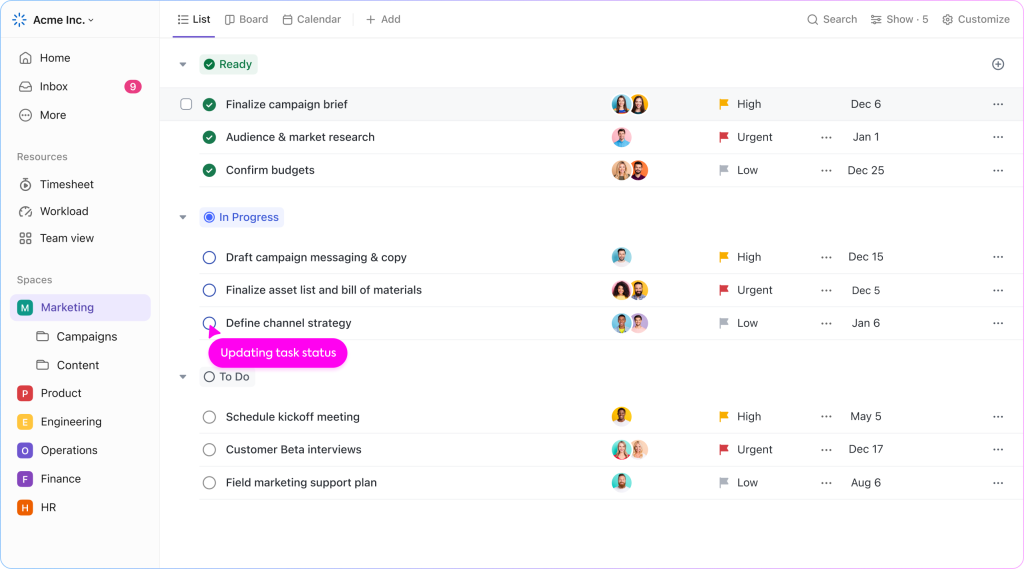
ClickUp positions itself as an all-in-one project management platform, offering a wide array of features to accommodate various workflows. From task management and document collaboration to goal tracking and time management, ClickUp aims to consolidate multiple tools into a single, cohesive platform.
Best for: Businesses looking for a scalable, all-in-one project management platform.
Pros:
- Supports multiple task views, including lists, boards, calendars, and Gantt charts
- Advanced goal-setting and reporting features
- Built-in time tracking to monitor productivity
- Strong integration capabilities with third-party apps
Cons:
- The interface may feel overwhelming for first-time users
Pricing (billed annually):
- Free plan: available.
- Unlimited Plan: $7 per user per month.
- Business Plan: $12 per user per month.
- Enterprise Plan: available upon request.
4. Asana
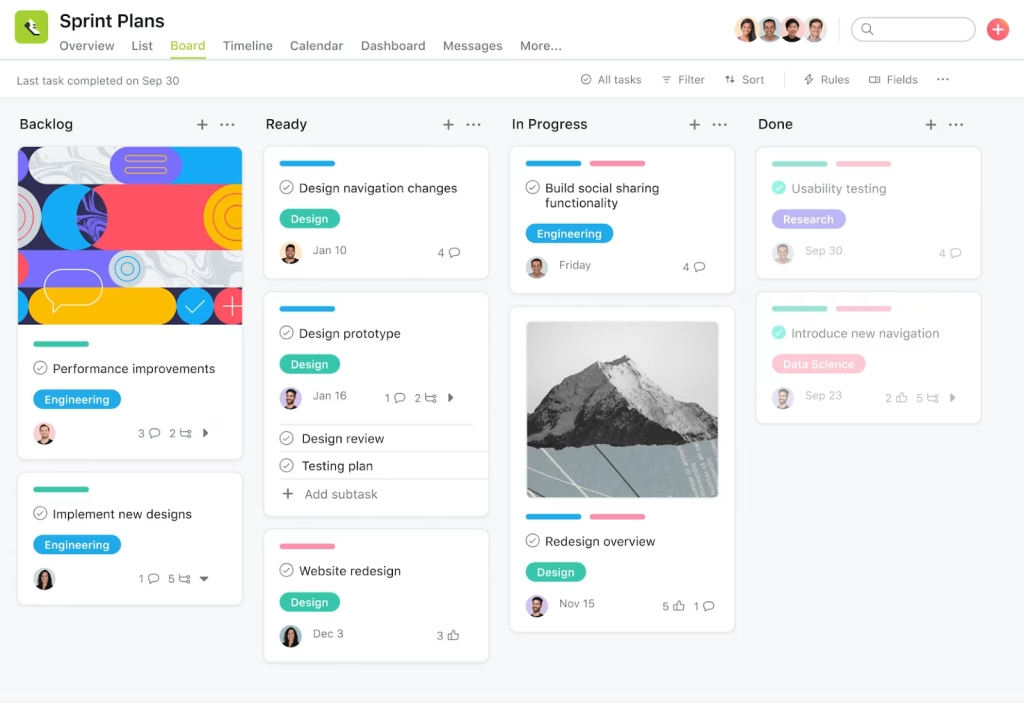
Asana is a robust project management tool designed to help teams coordinate and manage their work effectively. It offers multiple project views, including lists, boards, and timelines, allowing teams to choose the format that best suits their needs.
Best for: Teams that need structured workflows and detailed task tracking.
Pros:
- Project timelines and dependencies for better planning
- Advanced search and filtering options
- Task automation for recurring activities
- Customizable dashboard for tracking key metrics
Cons:
- Limited mobile app functionality
Pricing (billed annually):
- Personal: Free, with limited features.
- Starter: $10.99 per user per month.
- Advanced: $24.99 per user per month.
- Enterprise: custom pricing.
5. Monday.com
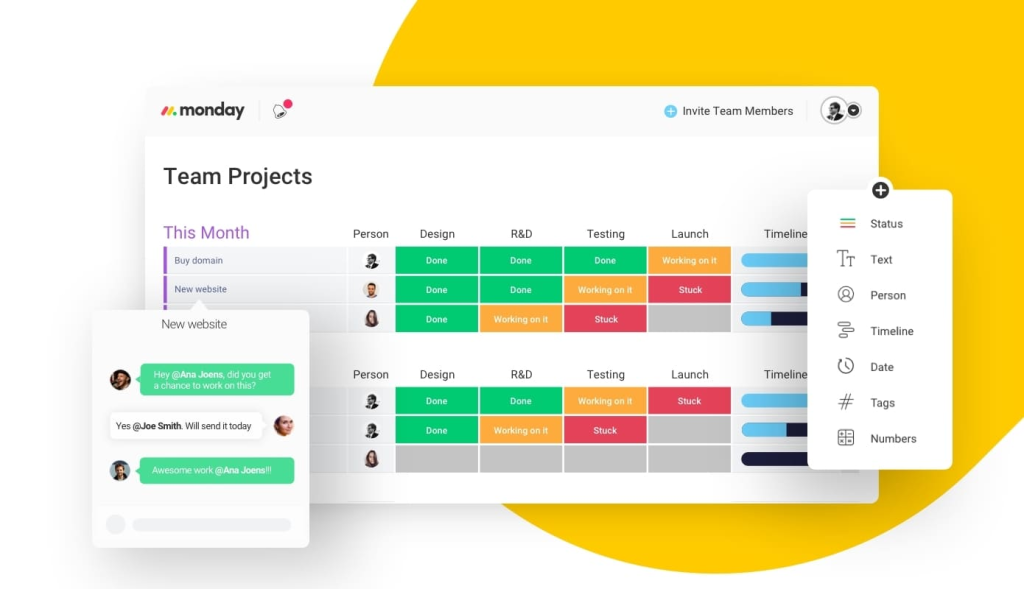
Monday.com is a highly customizable work management platform that enables teams to automate repetitive tasks, track progress, and improve collaboration. It offers intuitive dashboards, automation tools, and integration capabilities, making it an excellent choice for businesses of all sizes.
Best for: Teams looking for task automation and custom templates.
Pros:
- Built-in time tracking and resource management tools
- Advanced automation features to streamline tasks
- Robust reporting and analytics for performance tracking
- Boards that display tasks, deadlines, and progress in a visually organized manner
Cons:
- Limited to only three boards on the free plan
Pricing (billed annually):
- Free: available for up to two seats
- Basic: $9 per user per month.
- Standard: $12 per user per month.
- Pro: $19 per user per month.
- Enterprise: custom pricing.
6. Teamwork
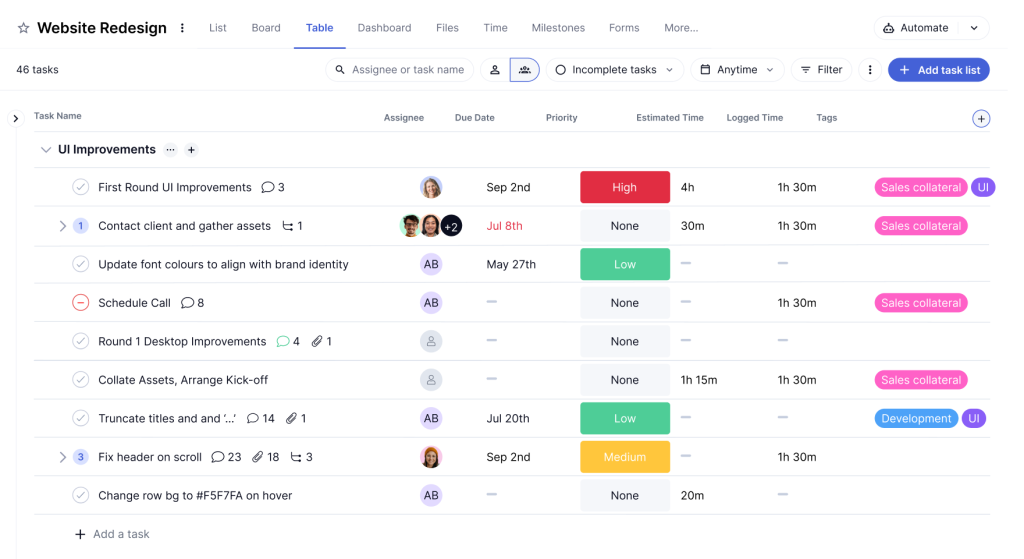
Teamwork is a client-focused project management software that stands out for its built-in time tracking, invoicing, and client collaboration tools. With features like workload balancing, task dependencies, and project profitability tracking, Teamwork helps teams stay organized, meet deadlines, and optimize resource allocation.
Best for: Businesses managing client projects and team workload.
Pros:
- Comprehensive project and task management features
- Strong time tracking, billing, and invoicing tools
- Detailed reporting and analytics for project performance insights
- Robust document storage and file-sharing capabilities
Cons:
- Requires a paid account to be able to view certain information
Pricing (billed annually):
- Free plan up to 5 users.
- Deliver: $10.99 per user per month.
- Grow: $19.99 per user per month.
- Scale: $54.99 per user per month.
- Enterprise: Custom pricing.
Conclusion
While Basecamp remains a popular tool, many Basecamp alternatives offer more customization, integrations, and advanced features to support growing teams.
Whether you prefer the AI-powered capabilities of FuseBase, the visual simplicity of Trello, or the all-in-one approach of ClickUp, there’s a project management tool to fit every team’s needs. Evaluate these options based on your workflow requirements and choose the best Basecamp alternative to optimize your business operations.